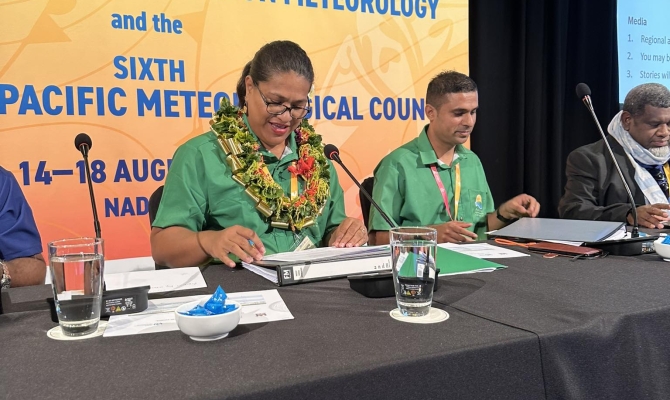Three-point Q and A with Bipen Prakash, Chair of the Sixth Pacific Meteorological Council
Now, more than ever, the crucial role that weather and climate plays in our lives has hit home. Temperatures reaching new global records across the world, extreme weather events, and marine heatwaves are our global reality.
This week in Fiji, the Sixth Pacific Meteorological Council is underway bringing together the Met Service Directors from across our Pacific Islands region. This will be followed by a Donor Roundtable and the Third Pacific Meteorological Ministers Meeting. Samoa has held the Chair of the PMC since it last hosted the event in 2019 before COVID-19 struck. Normally, a biennial meeting, it was today at the PMC-6 that Samoa handed the role of Chair over to Fiji – four years after the last PMC was held.
We spoke toBipen Prakash, Acting Director of the Fiji Meteorological Services.
Q. It’s been four years since the last PMC was held, what are the key outcomes you’d like to see here this week.
A. “One of the key deliverables is an agreement on the governance process of the Weather Ready Pacific Programme. As a region, this is something we really need – no one needs to be convinced of this, we are facing continuous and ever-increasing threats of natural disasters from Tropical Cyclones, floods, droughts as well as events from geo-hazards so Early Warning Systems are a priority for us. This will be addressed in the Weather Ready Pacific, a ten-year investment programme with a budget of over 150 million USD. We have a commitment from the Government of Australia for 30 million which is just the beginning. A lot more investment will be needed in this space before we can fully realise the potential benefits from this programme. We are aiming to have a governance structure agreed to which meets the need of our national meteorological and hydrological services but is also fully transparent to attract donors.
In addition to this, there are several priorities for Fiji nationally. One of our biggest issues is the turn-over of professional staff, as a priority at this meeting we’d like to see the establishment of, or progress towards, a regional training Centre which will help the continuous building of capacity. Our goal is the Centre to be able to award what we call the World Meteorological Organization Class 1, or Basic Instruction Package. We believe this can make a big difference.
Fiji would also like to see a regional instrument calibration Centre formed that will ensure our meteorological observations are up to international standards. What is happening now is we are sending our equipment outside of the region for calibration, but we have something in the region in which we can do this, it is both cost effective and it will improve our quality of observations significantly.”
Q. Has COVID-19 had a major impact upon the PMC itself?
A. “In all honesty COVID-19 delayed things but I must acknowledge the Government of Samoa and the leadership of Samoa as Chair of the PMC over this period. During the pandemic they did extremely well in ensuring there was still progress to improve our capabilities as Pacific Meteorological Services, and we have seen significant progress despite the setback of not being able to meet face-to-face. We have close to 200 people here today; we expected this good response as the PMC grows with every session. It’s great to have everyone that works in this space come together to agree upon regional activities amongst other things, so we provide better services for our people.”
Q. With the impacts of climate change, and the science being shared with us, our national Meteorological Services are a crucial part of our resiliency, how does the PMC play a role in this?
A. “That’s the job of the Met services so that we have a robust early warning system. We are going into a new uncertainty and the science is quite clear if we refer to the latest assessment of the Intergovernmental Panel on Climate Change. It is indicating we are heading towards unchartered waters when it comes to how things may change in future when it comes to our climate and weather. It’s extremely daunting to think of, but as a Met community we must ensure that we are prepared for what may come. We need to have a robust early warning system. Of course, there will be uncertainties in our forecasts as Met Services, but we must effectively communicate our uncertainties. We also need to invest in our prediction capabilities by investing in research to understand how things are changing, and what may continue to in change in future. This includes our modelling capacity to provide better forecasts for our people so they can be prepared.”
The Sixth Pacific Meteorological Council (PMC-6), the First Development Partners and Donors Engagement Meeting and the Third Pacific Ministerial Meeting on Meteorology (PMMM-3) are held in Nadi, Fiji respectively from 14 – 18 August 2023.
They follow a range of pre-PMC meetings held in Nadi Fiji from 07 – 12 August 2023.
The PMC-6, the First Development Partners and Donors Engagement Meeting and PMMM-3 is supported by a strong partnership between the following: The Government of Fiji, the Secretariat of the Pacific Regional Environment Programme (SPREP), World Meteorological Organisation (WMO), the European Union’s Intra-African Caribbean Pacific Climate Services and Related Applications (Intra-ACP) Project, United Nations Disaster Risk Reduction (UNDRR), Australian Department of Foreign Affairs and Trade (DFAT), New Zealand Ministry of Foreign Affairs and Trade (MFAT), Climate and Oceans Support Programme in the Pacific (COSPPac), Australian Bureau of Meteorology (BOM), Climate Risk Early Warning Systems (CREWS) Pacific Project, Commonwealth Scientific and Industrial Research Organisation (CSIRO), Pacific Community (SPC), Varysian, GCF Funded VanKIRAP project, the People’s Republic of China’s contribution to SPREP and OTT HydroMet.
For more information on the PMC-6 please visit the Pacific Met Desk website https://www.pacificmet.net/pmc-6-2023 or email sprep@sprep.org
SOURCE: SPREP/PACNEWS

















